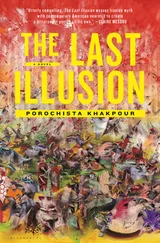Bruce Hood - The Self Illusion
Здесь есть возможность читать онлайн «Bruce Hood - The Self Illusion» весь текст электронной книги совершенно бесплатно (целиком полную версию без сокращений). В некоторых случаях можно слушать аудио, скачать через торрент в формате fb2 и присутствует краткое содержание. ISBN: , Издательство: Constable & Robinson, Жанр: Старинная литература, на английском языке. Описание произведения, (предисловие) а так же отзывы посетителей доступны на портале библиотеки ЛибКат.
- Название:The Self Illusion
- Автор:
- Издательство:Constable & Robinson
- Жанр:
- Год:неизвестен
- ISBN:9781780331379
- Рейтинг книги:5 / 5. Голосов: 1
-
Избранное:Добавить в избранное
- Отзывы:
-
Ваша оценка:
- 100
- 1
- 2
- 3
- 4
- 5
The Self Illusion: краткое содержание, описание и аннотация
Предлагаем к чтению аннотацию, описание, краткое содержание или предисловие (зависит от того, что написал сам автор книги «The Self Illusion»). Если вы не нашли необходимую информацию о книге — напишите в комментариях, мы постараемся отыскать её.
The Self Illusion — читать онлайн бесплатно полную книгу (весь текст) целиком
Ниже представлен текст книги, разбитый по страницам. Система сохранения места последней прочитанной страницы, позволяет с удобством читать онлайн бесплатно книгу «The Self Illusion», без необходимости каждый раз заново искать на чём Вы остановились. Поставьте закладку, и сможете в любой момент перейти на страницу, на которой закончили чтение.
Интервал:
Закладка:
Others argue that the data on teenage risk-taking is incontrovertible. It may be somewhat culturally influenced, but far from being erratic, teenagers are just as good as adults at reasoning about risk. They simply consider some risks to be worth taking to prove themselves. Developmental psychologist Lawrence Steinberg has shown that teenagers perform just as well as adults on simulated driving tasks when they are alone, but run more risks when friends are watching them. 16When friends were present, risk-taking by speeding and running red lights increased by 50% in teenagers whereas there was no increase in adults. One neural account is that the reward centres in the teenage brain are highly active during this period of development. Rewards are thus super-charged when individuals succeed in front of their friends which makes success all that more sweet and the risks to achieve them worth taking. But it is not enough to succeed. One has to be seen to succeed.
In the West, adolescents are faced with the paradox of wanting to be accepted by their peers but at the same time needing to be different. Music, fashion, films and, of course, sex are the things adolescents care about the most because these are the very things that help to create the unique identities they seek. It is no coincidence that these are the main topics of ‘likes’ and ‘dislikes’ in online social networks. Whenever you put something up on a social network, you are inviting a response from your peers. It is not for your own private viewing but rather you are broadcasting your presence to the world. The number of comments and hits your activities generate tell you and, more importantly, others that you matter. Most of us want to be noticed and social networking sites make this universal yearning the core of its activity. Having others validate your presence is the currency of popularity that individuals seek.
What a Twit I Am
One day earlier this year, the famous British actress, Dame Helen Mirren, started to follow me. I wasn’t walking down the road in London or Los Angeles where the Oscar-winner probably spends most of her time. Rather, I was seated at the kitchen table in my Somerset barn, taking a break to look at my Twitter account, when I saw that @HelenMirrenDBE was following me. Or at least I thought she was. My heart skipped a beat.
For the uninitiated, Twitter is a site where you can post any message so long as it is less than 140 characters. It’s like open access texting to the world where anyone who follows you can read your messages or link to images and other websites that you might put up. I currently have over 3,000 Twitter followers. I don’t even personally know that many people and if you sat me down, I would be hard-pressed to name a couple of hundred individuals. Even though my following may sound impressive, I am way down on the Twitter hierarchy. Individuals whom you would never imagine being icons of interest are huge on Twitter. Lance Armstrong, the top cyclist, has well over a million followers. So does the actor Brent Spiner. Who was Brent Spiner I wondered? None other than the actor who played the android, ‘Data’, on Star Trek . There are a lot of Trekkies out there!
What is it about Twitter that makes it so appealing? Why do we follow and want to be followed? It probably comes down to a number of related issues to do with the self. First, the human brain is a gossiping brain – we are nosey and want to know what others are up to even if that includes what they ate for breakfast that day. Second, we like our opinions to be validated by others. When someone responds positively to an opinion or shares it with others, we feel vindicated. Of course, if our opinion is rejected or ridiculed then our self-esteem is deflated. Having the option to follow or unfollow others means that individuals within a social network tend to share the same values and attitudes.
We also like to be the first to know something or spread the word. This is something we did as children. Remember how important it was to be the first to spread the word in a playground? If you were the last to find out something then that was a reflection of how important you were in the pecking order. By being the first to know something, we cement our self-importance with others. However, one of the most powerful draws of social networking sites like Twitter is that they make you feel important if you have a large number of friends or followers. Your self-worth is validated and the more followers and friends you have, the more you value your self.
Another reason why Twitter has taken off (it is the fastest growing social network) is that celebrities happily post their thoughts and updates on a regular basis. These used to be off-limits to the general public. Suddenly we have access to the famous in a way that was never possible before. The public’s appetite for celebrity trivia has long been insatiable. There is a whole industry of paparazzi and tabloid press that has evolved out of the primeval slime to provide the gossip to feed the masses but Twitter is far superior because it comes directly from the celebrities. Of course, celebrities need their followers because without the fans, they are out of the public eye, which usually also means out of work. So most now have Twitter presences. In fact, many employ writers to compose their tweets so that the illusion of accessibility and visibility is sustained.
The biggest boost to your self-esteem is if a celebrity such as Helen Mirren follows you. Whenever someone of a perceived higher status befriends us then we are raised in our standing by association. This is known as basking in reflected glory. Many of us take vicarious pleasure by associating with the success of others. This is why fans are so passionate about the individuals and the teams they support. Sports fans are probably the most common example. I have heard many a pub argument where fans lament the team manager’s decisions as if it were a family feud. Fans even talk as if they are a member of the team by using the pronoun, ‘we’. 17Twitter facilitates these distortions of reality by generating the illusion of easy accessibility to the famous. Anyone can follow a celebrity who is on Twitter, thus creating an interesting social phenomenon where we feel an intimacy with others whom we would never have the opportunity to meet in our normal lives. The relatively open access of Twitter also creates problems. Strangers feel that they are on a familiar basis with those they follow – which is not so very different from celebrity stalkers who are deluded in thinking that they share a life with their victims.
Karl Quinn, an Australian journalist, pointed out that Twitter is perfect for mob nastiness. It enables individuals to make cruel comments and then pass them on: ‘Many of us are in two minds about whether celebrities are flesh-and-blood human beings or merely life-sized piñatas in need of a damned good whacking.’ 18The trouble is that as soon as a victim is identified most of us are more willing to join in with the bullying than we imagine. Remember how that worked in the playground? It was easier than standing up to the mob. The same is true for Twitter – people join in with the mob rule. Also, with the problem of polarization (discussed shortly) that is endemic in social networking sites, attitudes and opinions will naturally shift towards more extremism as those who seem to agree with us egg us on or we feel the need to be more judgemental. With their combination of distorted opinions, rapid communication without the time for reflection and the perceived distance as well as anonymity, social networks are a perfect platform for us to behave in a way that we would not in real life.
This raises an important point with regards to the difference between online and offline selves. If we behave differently when we are online, then where is the true self if the self really does exist? Can we draw a real difference between thoughts and actions? If our actions are virtual and anonymous, are they any less representative of our true self? One could argue that because social rules and the pressure to conform in real life are so powerful for many, offline activities do not reflect our true attitudes and thoughts. If they can only be expressed online in the absence of the threat of any repercussions or social rejection, what kind of true self is that? That’s one reason why we need to be reminded that the self is an illusion if we believe that it can exist independently to the different contexts and influences of others. One might counter that there is only one self that behaves differently depending on the situation but that is the heart of the illusion. We are far more under the influence of contexts and others than we appreciate. Just like the alcoholic who thinks they can control their drinking, our self illusion prevents us from seeing just how far we are at the mercy of influences outside of our control.
Читать дальшеИнтервал:
Закладка:
Похожие книги на «The Self Illusion»
Представляем Вашему вниманию похожие книги на «The Self Illusion» списком для выбора. Мы отобрали схожую по названию и смыслу литературу в надежде предоставить читателям больше вариантов отыскать новые, интересные, ещё непрочитанные произведения.
Обсуждение, отзывы о книге «The Self Illusion» и просто собственные мнения читателей. Оставьте ваши комментарии, напишите, что Вы думаете о произведении, его смысле или главных героях. Укажите что конкретно понравилось, а что нет, и почему Вы так считаете.












